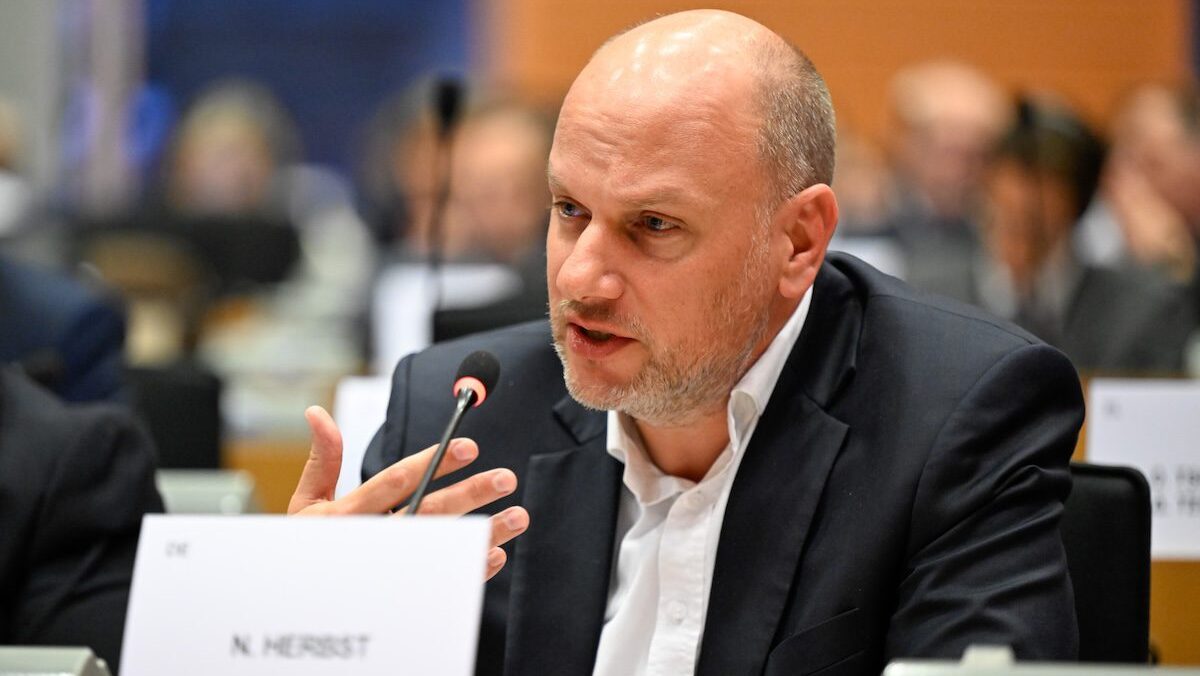
Niclas Herbst, the chairman of the EU Parliament’s budgetary control (CONT) committee.
Photo: Laurie Dieffembacq / © European Union 2024 – Source: EP
Brussels’ most recent cash-for-lobby scandal, involving the allegations of taxpayer-funded interference from environmental NGOs, has been escalating in the past couple of days. The EU Parliament’s EPP-led budgetary control (CONT) committee is now pushing to open separate investigations into all similar contracts—pertaining to not one, but five policy areas.
Recent documents leaked to the press show that MEP Niclas Herbst, the chair of the CONT committee, requested to audit all EU Commission contracts awarded to NGOs, including Transparency International—whose mission is “to stop corruption and promote transparency, accountability, and integrity”—by five directorates-general: environment, climate, agriculture, justice, and home affairs.
The concerns about the Commission’s potential misuse of vast amounts of EU taxpayer funds emerged after Dutch media revealed that at least €700,000 was given to environmental NGOs to influence MEPs, national governments, and voters alike into backing the EU’s controversial Green Deal—an decision that the Commission defended last week by saying the money was merely to “raise awareness” about climate change.
EPP’s Monika Hohlmeier, a member of CONT, lent additional credibility to these allegations last week by revealing irregularities she identified in a €15 million grant awarded by Commission to green NGOs as part of the EU’s main environmental funding instrument, LIFE.
She claimed that at least some parts of the grant were given by the environmental directorate specifically to have green NGOs push forward the Green Deal on its behalf, and demanded a review of these contracts by the EU’s Internal Audit Service.
After receiving multiple requests from MEPs, Herbst is now trying to widen the scope of this investigation to cover other policy areas, such as migration, agriculture, justice, and the rule of law—hence the inclusion of Transparency International, among others.
While it’s more likely that the mainstream EPP aims to prevent being caught off-guard by future scandals rather than genuinely hold the EU Commission accountable—since the Commission is also led by the EPP—leftist parties didn’t hold back on their criticism.
A spokesman for the social democrat S&D—the EPP’s main coalition partner in the Parliament—called this campaign from Herbst and Hohlmeier “outrageous” and accused the centrists of “naming and shaming [NGOs] under the false pretext of caring for transparency.”
Green MEP Daniel Freund also pushed back against scrutinizing NGOs and said if that was the case then auditors should also look at contracts with business and trade associations. “I don’t want it to be just NGOs, so then I want to see all the contracts, whether they are with companies, think tanks, any legal entity,” Freund said. It’s unclear why he thinks this would be a problem for conservatives—the more transparency, the better.
Transparency International reacted similarly—saying the EPP was taking a page out of the populist Right’s playbook by attacking NGOs—which perhaps is not the best strategy to show you have nothing to hide.
At the same time, the NGO’s European director Nicholas Aiossa added important context by arguing that Transparency International is targeted by the EP’s largest group because, in the past, they “highlighted potential and continued potential conflicts of interest of lucrative side gigs held by senior EPP members.” Essentially, Aiossa added, the EPP is conducting a “vendetta against civil society” for revealing the party’s corruption.
But for conservatives, it’s not enough to lean back and watch as the EPP and its pet NGOs tear each other apart. The momentum should be used to facilitate real change and accountability, starting with the disastrous climate legislation of the Green Deal.
The Patriots for Europe (PfE) and the European Conservative and Reformist (ECR) groups joined last week under a conservative initiative to “suspend and re-evaluate” the Green Deal in light of these allegations, but the EPP refused to lend them their support and form the “alternative majority” needed for success.
“My job is to scrutinize how taxpayers’ money is used,” Herbst replied to the leftist criticism, adding that “the Commission has to change its ways.” But if the EPP was truly committed to uncovering the truth about these misuses of funds, it should also be concerned about addressing their consequences. For now, it seems climate targets are more important than true accountability.
